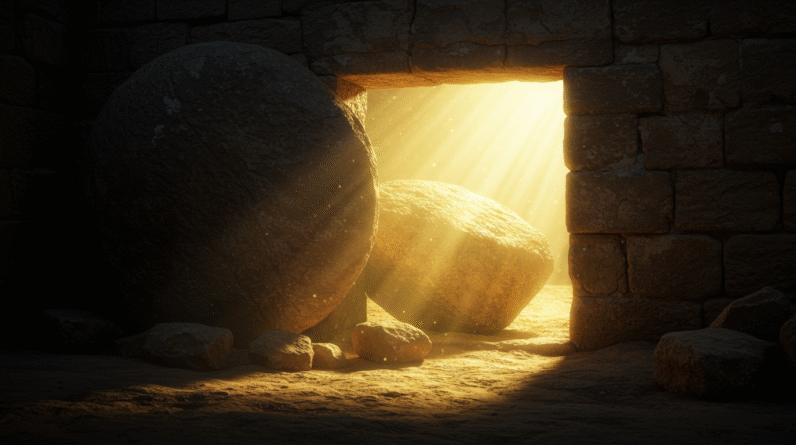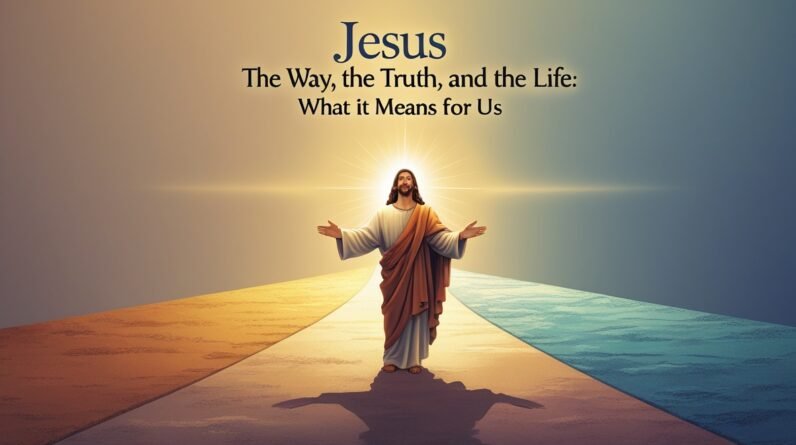The Divinity of Jesus: Proof That He Is God In The Flesh
You’ve come to a question that stands at the heart of the Christian faith: Is Jesus truly God in the flesh? The “Divinity of Jesus” isn’t a theological curiosity for scholars alone — it’s the foundation of your hope, the center of your worship, and the reason the gospel changes lives. In this article, you’ll walk through clear biblical evidence, reasoned argument, and pastoral reflection that point to Jesus as the incarnate God. I’ll lead you through Old Testament foreshadowing, Jesus’ own claims, the apostolic witness, and the concrete signs that confirm His divine authority and oneness with the Father.
Why the Divinity of Jesus Matters
When you consider the “Divinity of Jesus,” you’re not dealing with an abstract doctrine. If Jesus is God in the flesh, then His life, death, and resurrection have cosmic meaning: He can save you, forgive your sins, and reconcile you to God. If He is not, Christianity collapses into moral teaching and nice words about love, but lacks the power to redeem and rescue. So you should care deeply about this truth. Your eternal destiny, the nature of salvation, and your relationship with God hinge on whether the One you follow is merely a good teacher or truly God who came to dwell among men.
Old Testament Shadows Pointing to the Divine Messiah
Long before Bethlehem, the Old Testament prepared your heart and mind for the coming of One who would be more than a human king. The Scriptures repeatedly describe a coming ruler and redeemer with divine attributes — a figure whose name, titles, actions, and destiny point beyond ordinary humanity.
Names and Titles That Speak of Divinity
Even the names assigned to the promised child convey divine identity. Isaiah foretold a child whose names would capture God’s own nature: “Wonderful Counselor, Mighty God, Everlasting Father, Prince of Peace.” Read Isaiah’s promise and notice how the language moves beyond a mere human leader to divine authority: Isaiah 9:6. When you read this, you must ask whether the prophets could intend a mere mortal with such titles. The weight of the language pushes you to see the Messiah as God with us — Immanuel — which Isaiah explicitly declares in Isaiah 7:14.
Prophecies of a Divine Ruler
Prophets like Micah and Daniel gave details that underscore the preeminent status of the coming Messiah. Micah predicted a ruler from Bethlehem whose origin and eternal rule signal something beyond human lines: Micah 5:2. Daniel’s vision of the “one like a son of man” receiving everlasting dominion (Daniel 7) anticipates not just kingship, but a cosmic reign that courts describe in divine terms: Daniel 7:13-14. These Old Testament witnesses prepare you to expect a Savior who will both suffer and rule — a Savior whose role reaches into the divine realm.
New Testament Declarations of Divinity
When you turn to the New Testament, the claims become explicit and unavoidable. The apostles and Jesus Himself use language that identifies Jesus with the God of Israel. The New Testament presents not only prophetic fulfillment but also direct statements and actions that reveal Jesus’ divine nature.
John’s Prologue: The Word Was God
If you want a clear, theological statement of the “Divinity of Jesus,” begin with John’s opening chapter. John writes that “the Word was with God, and the Word was God,” and then declares that the Word became flesh and dwelt among us. This is a profound claim: the eternal Word, who was God, took on human nature so you could see God in person. Read John’s words and reflect on their force: John 1:1-14. For your faith, this passage is decisive: Jesus is not merely a reflection of God; He is God dwelling among you.
Jesus’ Own Claims to Unity with the Father
Jesus didn’t leave you to guess about His identity. He made direct claims that would have been understood by His Jewish listeners as statements of divine status. Consider when Jesus declares, “I and the Father are one.” This is not merely unity of purpose — in context, and by the reaction of His contemporaries, it signals an ontological unity that provoked accusations of blasphemy: John 10:30. Another startling claim was, “Before Abraham was born, I am,” using the divine name “I AM” which God used in the Old Testament (Exodus 3:14). The crowd immediately understood and sought to stone Him: John 8:58.
Titles Given by the Apostles
The apostles, moved by the Spirit, attribute the nature of God to Jesus in terms that are unmistakable. Thomas’s confession echoes the heart of early Christian worship when he falls at Jesus’ feet and exclaims, “My Lord and my God!” This is not corrected by Jesus; rather, He accepts the worship and commissions belief: John 20:28-29. The apostle Paul writes that in Jesus “all the fullness of the Deity lives in bodily form,” a direct affirmation of the “Divinity of Jesus”: Colossians 2:9. Hebrews opens with Jesus described as the radiance of God’s glory and the exact representation of His being: Hebrews 1:3.
Miracles and Authority: Signs of Divine Power
If you want to see evidence that Jesus is God in the flesh, look at the works He did. Miracles don’t merely wow the crowd; they reveal who Jesus is — showing power over nature, disease, demons, and death.
Power Over Nature and Creation
When Jesus calmed the storm with a word, the disciples asked, “Who is this? Even the wind and the waves obey him!” The miracle is not proof alone, but it signals authority over creation itself: Mark 4:39-41. If Jesus made the waves obey Him, He commands the created order in ways reserved for God.
Authority to Forgive Sins
One of the clearest demonstrations of Jesus’ divine prerogatives is His claim and exercise of authority to forgive sins. Only God can forgive sins, and yet Jesus forgave the paralytic standing before Him — and backed His words with healing to prove His authority. The scribes understandably asked, “Who can forgive sins but God alone?” and Jesus’ response was to heal: Mark 2:5-12. When you consider your own need for forgiveness, this claim becomes personally crucial: if Jesus can forgive your sins, He is not a mere man.
Ruling Over Demonic Powers
Jesus repeatedly demonstrated authority over demonic forces, casting them out with a word and restoring lives. These acts are signs that the kingdom of God had come with Jesus’ presence and that He holds power over the unseen spiritual realm: Luke 4:36. When demons submit, it indicates that the Lordship of Jesus extends into spiritual realities that only God could conquer.

Resurrection: The Ultimate Proof
Of all the events in Jesus’ life, the resurrection stands supreme as proof of His divine identity. You can tolerate a teacher who died; you can admire a prophet who perished. But God vindicated Jesus by raising Him from the dead, and in doing so confirmed everything Jesus claimed about Himself.
Apostolic Witness and Empty Tomb
The early church’s proclamation focused overwhelmingly on the resurrection. The apostles testified repeatedly and boldly that God raised Jesus, and they preached a risen Lord who is alive. The empty tomb, the appearances to many, and the transformed lives of the disciples point to an event that can only be explained by divine power: 1 Corinthians 15:3-8. For you, this means the Jesus who died is the Jesus who lives — He is able to give you new life.
Defeating Death and Securing Your Hope
When Paul says that Christ was raised from the dead, and because He lives, you will also live, he links Jesus’ resurrection to your future: 1 Corinthians 15:20-22. The resurrection validates Jesus’ claim to be God and secures your hope in the promise of eternal life. If Jesus is risen, then He possesses power over death, and nothing less than divine authority could effect that victory.
Jesus Fulfills Old Covenant Promises and Institutes the New
The “Divinity of Jesus” is also revealed in how He fulfills the Old Testament and inaugurates the New Covenant. You’ll see continuity with God’s promises to His people and the fulfillment of sacrificial realities in Christ.
Fulfillment of Prophecy
Matthew’s Gospel, among others, highlights fulfillment after fulfillment, showing that Jesus was the God-ordained culmination of God’s redemptive plan. Prophecies are not vague; many point to details like birthplace, manner of suffering, and resurrection. The New Testament writers connect Jesus’ life to these predictions to demonstrate that what God promised, God accomplished in Christ: Matthew 1:22-23, Matthew 2:5-6, Matthew 27:35.
Instituting the New Covenant
At the Last Supper, Jesus spoke of the cup as “the new covenant in my blood,” linking His death to the renewal of your relationship with God: Luke 22:20. Only someone with divine authority could establish an eternal covenant that changes the status of sinners before a holy God. His resurrection then ratifies that covenant and assures you that God’s promises are fulfilled in Him.
Titles That Declare Divine Identity
Throughout Scripture, Jesus is called names and titles that belong to God. These titles reveal the “Divinity of Jesus” and invite you to worship.
Son of God and Son of Man
The title “Son of God” indicates divine filiation and authority; when Jesus is called Son of God, the New Testament equates that with sharing in God’s nature and mission: Matthew 16:16-17. The title “Son of Man,” while emphasizing humanity, also reaches back to Daniel’s vision where the figure given everlasting authority transcends human rulership: Daniel 7:13-14. In Jesus, these titles meet — fully human and fully divine.
Lord and God
New Testament writers use the term “Lord” (Kyrios) in reference to Jesus in ways that equate Him with Yahweh of the Old Testament. For example, Peter’s confession and Paul’s preaching often refer to Jesus as Lord, a claim that places Him in the same class as the God of Israel: Acts 2:36, Philippians 2:10-11. Revelation even assigns to Christ the titles “Alpha and Omega,” the one who is, who was, and who is to come — language reserved for God Himself: Revelation 1:8.
Apostolic and Early Church Confessions
It wasn’t merely theology constructed centuries later — the earliest Christian witnesses, including the apostles, worshiped Jesus and taught His divine identity. Their sermons, letters, and churches treated Jesus as God, receiving worship and directing prayer in His name.
Worship of Jesus
From the earliest days, people bowed and worshiped Jesus — the kind of adoration Scripture reserves for God alone. When the Magi came, they “fell and worshiped him” at the manger: Matthew 2:11. When the disciples saw Jesus still alive after the resurrection, they worshiped Him: Matthew 28:9. Scripture never rebukes legitimate worship offered to Jesus; instead, it affirms that worship belongs to Him.
Early Church Creeds and Confessions
By the time the New Testament letters were written, the Christian community confessed Jesus’ deity in simple but profound creeds embedded in their preaching. Paul summarizes the gospel with a focus on death, burial, and resurrection — actions tied to God’s saving purpose and authority: 1 Corinthians 15:3-4. The letters instruct believers to bow to Christ as Lord, to pray in His name, and to rely on His divine power. This communal confession should shape your own understanding and worship.
Theological Implications of the Divinity of Jesus
When you accept the “Divinity of Jesus,” several vital theological truths fall into place. These aren’t abstract dogmas; they shape how you pray, trust, and live.
Atonement by One Who Is God
Only someone who is both fully God and fully human could mediate between a holy God and sinful humanity perfectly. As God, Jesus’ sacrifice has infinite worth; as man, He represents you. Paul puts it plainly: God “was pleased to have all his fullness dwell in him” so that by the power of His sacrifice you might be reconciled: Colossians 1:19-20. The Cup of salvation becomes meaningful because the Son is divine.
Revelation of God
If Jesus is God, then in knowing Him, you truly know the Father. Jesus said, “Anyone who has seen me has seen the Father.” The “Divinity of Jesus” assures you that God is not a distant, unknowable being; He has entered time and space so you can encounter Him personally: John 14:9. Your prayer life and intimacy with God rest on this revelation.
Assurance of Sovereignty and Resurrection Life
God’s sovereignty means your life is not aimless; when Jesus is Lord, history moves toward God’s purposes. Because the risen Christ reigns, you have hope beyond the grave: Ephesians 1:19-23. Your faith is secure because the one who holds the cosmos is the Savior who loves you.
Addressing Common Objections
You may have honest objections or doubts. Many people wrestle with whether attributing deity to Jesus contradicts monotheism, or whether the New Testament worshiped a great human figure. Scripture and reason join to answer these concerns.
Isn’t This Polytheism?
No. The Bible consistently affirms one God. The “Divinity of Jesus” does not mean three separate gods, but one God in three persons — Father, Son, and Holy Spirit — a mystery rooted in Scripture’s witness to the relational life of God. Jesus’ statements of unity with the Father and the Spirit’s role in the economy of salvation point to one divine essence shared by three persons: John 14:16-17, Matthew 28:19.
Wasn’t Jesus a Great Teacher Only?
If Jesus were merely a great teacher, He would not have said the things He did, accepted worship, or risen from the dead. His claims about forgiveness, divine authority, and pre-existence are unprecedented for any mere moral teacher. The resurrection validates His words and authority: Romans 1:4.
How Should You Handle Paradoxes?
You will encounter mysteries in theology; the Incarnation and Trinity are deep. But faith is not blind. The “Divinity of Jesus” is grounded in revelation — clear enough for you to trust, profound sufficient for you to worship. Scripture invites you to ponder and respond: not to escape complexity, but to enter into the wonder of God’s self-revelation.
How You Can Respond
Knowing the “Divinity of Jesus” carries personal consequences for you. This knowledge invites a response of faith, repentance, worship, and a life shaped by the Lord who is God.
Believe and Receive
The simplest, most life-altering response is to believe that Jesus is God who died and rose for you. Scripture invites you to put your trust in Him: “If you declare with your mouth, ‘Jesus is Lord,’ and believe in your heart that God raised him from the dead, you will be saved.” Take these words personally and act on them: Romans 10:9-10.
Live Under His Lordship
To confess the “Divinity of Jesus” is to let Him reign over your life. Worship Him, obey His commands, and let the reality of His deity shape your priorities. The apostles called people to repentance and baptism in Jesus’ name so they would receive the Holy Spirit and the transforming power of the risen Lord: Acts 2:38.
Grow in Relationship Through Scripture and Prayer
If Jesus is God, then the way you know Him is through the Word and prayer. Read the Gospels and the apostolic letters deliberately, and bring your heart to Him in prayer. The Scriptures are the primary place where the “Divinity of Jesus” meets your life, revealing who He is and how He saves: 2 Timothy 3:16-17.
Conclusion: The One Who Came to Be With You
When you survey the Old Testament prophecies, the New Testament testimonies, Jesus’ own claims, His miracles, and the resurrection, the cumulative witness points powerfully to the “Divinity of Jesus.” He is the Word who was with God and was God; He is Immanuel — God with you. He forgives sins, commands nature, rises from the grave, receives worship, and institutes a new covenant that secures your eternal hope. This is not an abstraction; it is the living truth that draws you into a relationship with the living God.
If you’re reading this and don’t yet know Jesus personally, I urge you to take a step of faith today. Tell Him honestly that you need Him. Believe in His death and resurrection. Receive the gift of forgiveness and the promise of new life. If you already follow Christ, let the truth of His divinity deepen your praise and shape how you live in the world.
Explore More
For further reading and encouragement, check out these posts:
👉 7 Bible Verses About Faith in Hard Times
👉 Job’s Faith: What We Can Learn From His Trials
👉 How To Trust God When Everything Falls Apart
👉 Why God Allows Suffering – A Biblical Perspective
👉 Faith Over Fear: How To Stand Strong In Uncertain Seasons
👉 How To Encourage Someone Struggling With Their Faith
👉 5 Prayers for Strength When You’re Feeling Weak

📘 Jesus and the Woman Caught in Adultery – Grace and Mercy Over Judgement
A powerful retelling of John 8:1-11. This book brings to life the depth of forgiveness, mercy, and God’s unwavering love.
👉 Check it now on Amazon
As a ClickBank & Amazon Affiliate, I earn from qualifying purchases.
Acknowledgment: All Bible verses referenced in this article were accessed via Bible Gateway (or Bible Hub).
“Want to explore more? Check out our latest post on Why Jesus? and discover the life-changing truth of the Gospel!”








